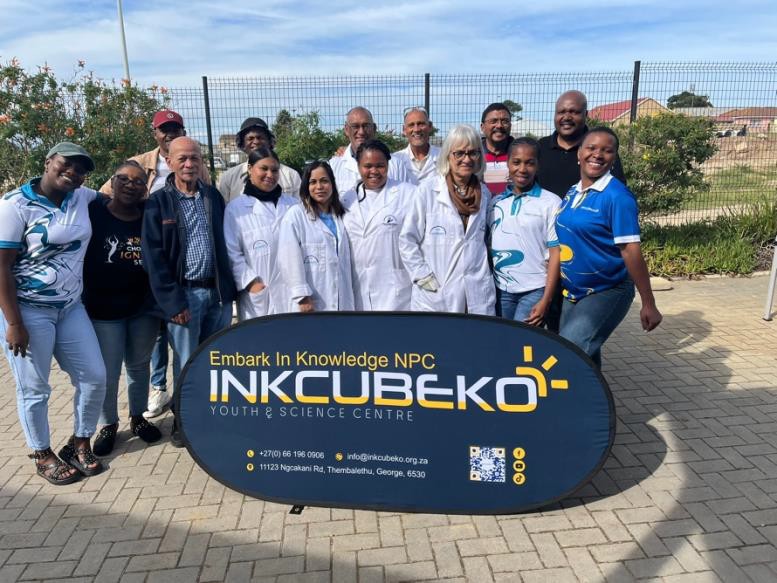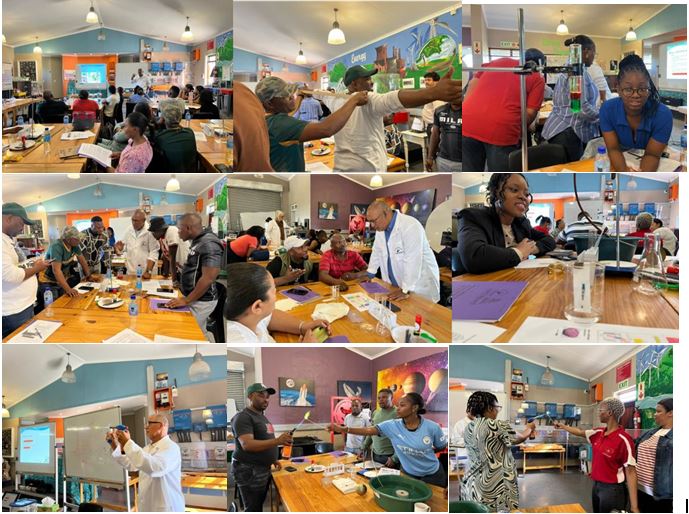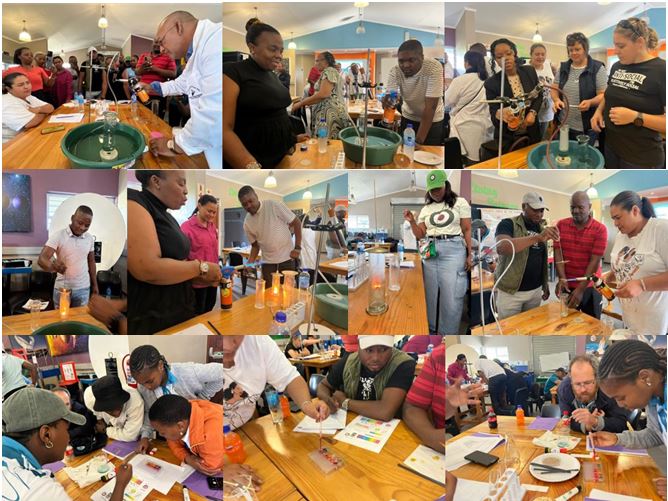
Advancing Knowledge NPC (AK NPC) continued its inquiry-based STEM education training for senior phase (grade 7-9) natural sciences teachers at the Inkcubeko Youth & Science Centre in Thembalethu, George. The first 2-day training session was conducted at the beginning of February 2025 and dealt with the curriculum content of the first school term’s work in Natural Sciences namely Life Sciences. The second 2-day session addressed the second school term’s content of the senior phase Natural Sciences CAPS curriculum called the Matter and Materials knowledge area or generally known as chemistry. The training took place on 11 and 12 April 2025. This project is a partnership between AK NPC and Inkcubeko Youth & Science Centre supported by the Curriculum Division of the WCED Eden and Central Karoo Education District. The training approach adopted and agreed upon by the partnership is directed at providing teachers with the inquiry skills to do hands-on practical and experimental lessons as required by the curriculum. The course made provision for 30 natural sciences teachers and 30 mathematics teachers from the Eden & Central Karoo schools. Mr Innocent Ndlovu of the Inkcubeko Youth & Science Centre did the welcoming and made the venues and resources of the centre available to all participants. Prof Hartley, Director of AK NPC informed teachers of the process followed for the SACE-endorsed course and the requirements to earn maximum professional development points on their SACE portfolio. Mr Keenan Rasmus, science subject advisor for the district encouraged teachers to incorporate the inquiry-based skills adopted on the course in their everyday natural sciences lessons.

CHEMISTRY FOR SENIOR PHASE (GRADE 7-9) TEACHERS THROUGH AN INQUIRY LENS
The content for senior phase (grades 7-9) natural science in the second school term is the curriculum knowledge area called Matter & Materials (chemistry). The course was facilitated by Prof Shaheed Hartley and Ms Zaiboeniesa Ahmed supported by Projects Coordinator Melissa Petersen and the AK NPC science interns Yusra Joubert and Somila Dlakavu. The inquiry-based approach in chemistry was introduced through a series of experimental simulations and examples identifying issues around dependent, independent and constant variables. Prof Hartley explained the importance of evidence in a scientific process of data collection by giving teachers a problem to analyse and challenging them to use the steps of the scientific method to evaluate and challenge their original hypothesis. Teachers were quite excited by the hands-on activities conducted during the course and actively participated in all the investigations and experiments. The course took teachers through and understanding of matter, elements, the periodic table, molecules, compounds, mixtures, chemical reactions and equations, etc and the inquiry-based presentation of the chemistry content. Teachers were actively involved in identifying, differentiating and distinguishing various chemistry concepts and debating issues such as the scientific method, the importance of context and content, molecules and compounds, density and buoyancy, etc.

The practical hands-on activities that teachers delved in directly included chromatography, liquids of different viscosity, heated metals identified through their colour fluorescence, acids, bases and neutralisation, preparation and testing of three gases namely oxygen, hydrogen and carbon dioxide, burning of metals and non-metals in oxygen and the reaction between hydrogen and oxygen gas. Teachers were continually constructively engaged through inquiry-based activities in a hands-on creative space provided by the facilitators. The interactive nature of the sessions were specifically
developed to allow teachers to ask questions but also to be able to try the experimental activities out on their own. In the end many teachers stayed behind to further practice the activities and build confidence so that they could apply it in their everyday natural science classes. An assessment of the individual teacher’s approach in their chemistry lessons will be conducted during the second term.
USING AN INQUIRY-BASED APPROACH FOR SENIOR PHASE (GRADES 7-9) MATHEMATICS TEACHERS
The course was conducted by experienced facilitators namely Dr Victor Hess and Dr Clyde Felix supported by the AK NPC interns. The facilitators concentrated on the senior phase mathematics content required for the second school term including numbers, operations and relations, patterns, functions, algebraic expressions, algebraic equations and geometry. Teachers were engaged in a calm and professional atmosphere and encouraged to present their approach to teaching the content in their mathematics classes. A series of discussions ensued in which each approach was respected and appreciated to allow teachers to understand the value they add to the didactic discussion. The deliberations and interactions were coordinated and channelled by the facilitators to progress the discourse. Each section of the second term senior phase mathematics curriculum content were expertly delved into to allow teachers different perspectives and approaches of including inquiry skills into their lessons. An assessment of the individual teacher’s approach in their mathematics classroom will be conducted during the second term.